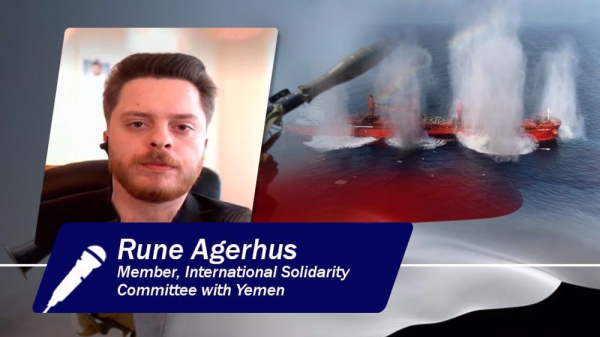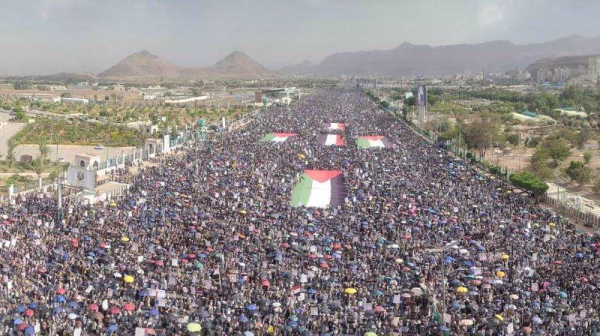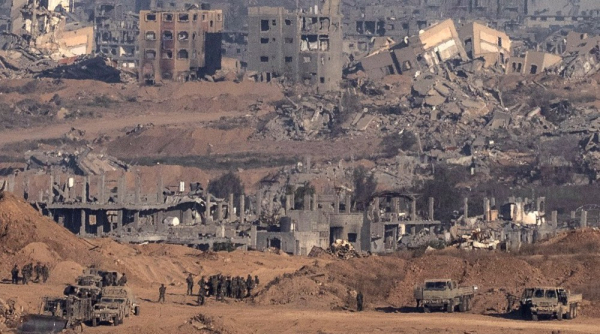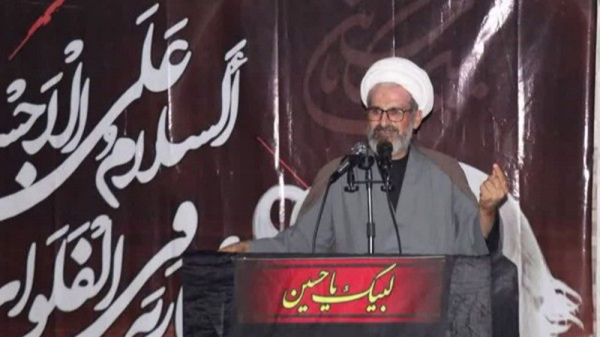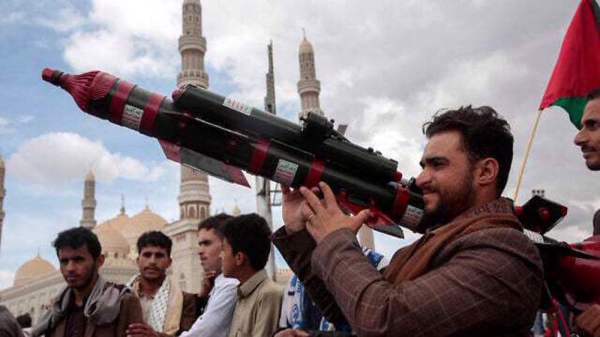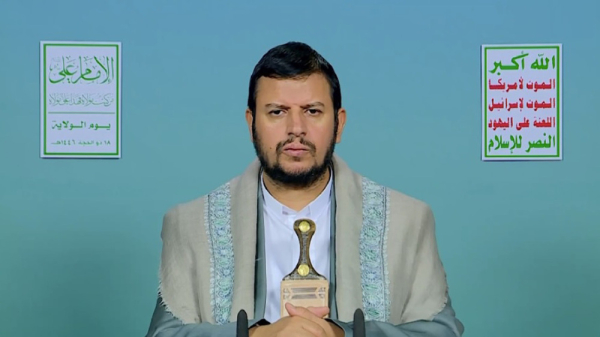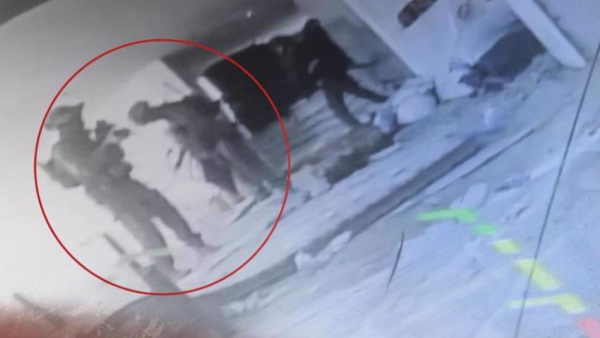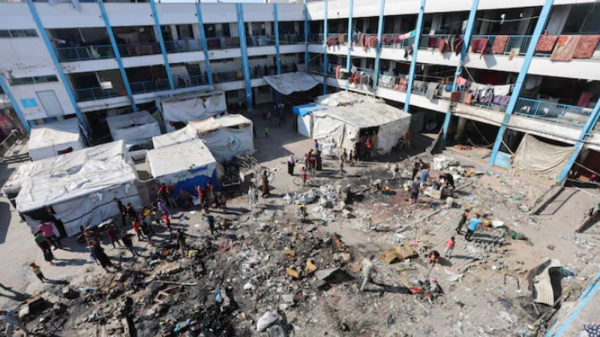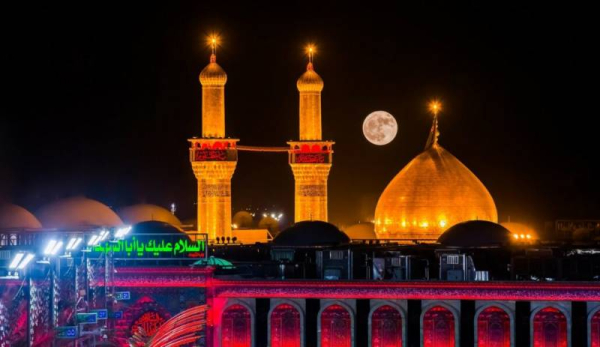zarezadeh
Yemeni military retains strategic upper hand despite acts of aggression by US, Israel: Analyst
By Press TV Website Staff
Yemeni armed forces retain the strategic upper hand and remain fully capable of asserting their sovereignty and enforcing the naval blockade despite repeated acts of aggression by the US and Israel, says an analyst.
In an interview with the Press TV website, Rune Agerhus, a political commentator and member of the International Commission for Solidarity with Yemen (ICSY), hailed the recent operations by the Yemeni military against vessels in the Red Sea headed to the occupied territories.
He said these developments are "highly significant for several reasons."
"Despite repeated acts of aggression by both the United States and Israel—the latter even boasting about neutralizing the seized car carrier Galaxy Leader, which they claimed had been converted into a stationary radar platform—the Yemeni Armed Forces retain the strategic upper hand and remain fully capable of asserting their sovereignty and enforcing the naval blockade," Agerhus said.
The widely respected analyst on Yemeni affairs noted that the video released on the operation to neutralize the vessel “Eternity C” included the first-ever audiovisual documentation of the use of an Anti-Ship Ballistic Missile (ASBM) by Yemeni forces.
"The message conveyed by these operations is unmistakable: Yemen’s steadfast commitment to the Palestinian cause and its determination to continue military operations until a ceasefire is reached in Gaza. The 'Yemen question' remains a persistent and unresolved challenge for both the United States and Israel," he remarked.
The operations were carried out by the Yemeni armed forces in solidarity with the Palestinian resistance and in response to the ongoing Israeli genocidal war on the Gaza Strip.
Agerhus described US President Donald Trump as an "impulsive and opaque oligarch" driven by a "desire for immediate results that serve his personal interests and bolster his appeal among core supporters."
He said the ceasefire between the US and Yemen, on Trump's initiative, was precipitated by "a series of strategic and operational failures by CENTCOM and the US 6th Fleet, including the loss of three F-18 fighter jets and over two dozen MQ-9 Reaper drones."
"These setbacks significantly undermined the United States' ability to project power in the region, a blow to Trump, who had anticipated a swift campaign lasting no more than a month," noted the analyst.
"Recent indications suggest Israel is once again pressuring the United States into direct military engagement, leaving the outcome largely contingent on Trump’s willingness—or unwillingness—to resist Israeli demands."
Yemen’s advanced military capabilities, which have been on full display in the past two years amid the Israeli-American genocidal war on Gaza, stem from its "sophisticated human capital," he asserted.
"Yemeni engineers trained in Iraq and the former Soviet Union and returned home to contribute to the development of the country’s strategic defense infrastructure well before the 2015 war. This creative and technical ingenuity has become a key asset, even under conditions of siege and blockade," he stated.
"With Iranian technical support, Yemen has established a domestic defense industry operating with assembly-line efficiency. The low cost of production does not reflect a lack of sophistication; rather, Yemen has mastered the craft of developing an advanced arsenal at a fraction of the cost other nations invest in their militaries."
He particularly referred to the conversion of Soviet air-to-air missiles into surface-to-air defense systems, the enhancement of range and fuel capacity for Korean-origin missiles, and the in-house design and manufacture of new missile systems as examples.
"This is a remarkable feat given the United States’ decades-long effort to systematically degrade Yemen’s defensive capacity and eliminate it as a strategic threat to the Red Sea trade corridor and, by extension, the global economy," Agerhus stressed.
On Yemen's unflinching and iron-clad support for the Palestinian cause at a time when other Arab states have become mute spectators to the raging genocidal war against Palestinians in Gaza, the analyst said, "to be Yemeni is to be loyal to Palestine."
"Yemeni identity is deeply rooted in a modern history of anti-colonial and anti-imperialist struggle. The Yemeni people are actively engaged today because they remember their own historical experiences—passed down across generations—of national transformation throughout the 20th and 21st centuries," Agerhus said.
Press TV’s website
How Iran’s energy sector foiled aggressors’ game plan
The recent 12-day Israeli and American aggression against Iran tested the robustness of the country’s energy sector which emerged not only functional but surprisingly resilient.
Despite intense assaults on critical infrastructure, including oil, gas, and nuclear facilities, Iran’s fuel production and distribution, particularly of gasoline, continued without interruption.
This illustrates a remarkable feat of operational resilience for Iran’s hydrocarbon-dependent economy, where energy security is fundamental to economic stability.
The oil and gas sector is deeply intertwined with the daily functioning of the economy. It accounts for a significant share of GDP, employment, and government revenue.
Interruptions in energy supply can cascade into economic disruptions, affecting transportation, industry, and household consumption, inflating costs, and ultimately destabilizing social order.
The recent aggression clearly aimed to undermine this backbone and inflict maximal economic damage. However, Iran’s ability to sustain uninterrupted fuel flows throughout the war revealed a resilient industrial ecosystem.
Keeping the energy flowing not only preserved economic activity but also sustained public confidence during heightened geopolitical tensions, forestalling inflationary pressures and fuel shortages that might have destabilized markets.
At the heart of Iran’s success lies the integration of its energy value chain. The Ministry of Oil, alongside entities such as the National Iranian Oil Company (NIOC), the National Iranian Gas Company, and the National Iranian Oil Refining and Distribution Company (NIORDC), operated with an unprecedented degree of coordination. This collective synergy allowed for real-time sharing of information, resources, and personnel.
For instance, two gas refineries quickly brought partially damaged facilities back online, demonstrating operational agility and coordinated response. This degree of synergy minimized downtime and enhanced resource and information flows across the sector.
Moreover, the deployment of contingency plans—drafted in anticipation of such crises—enabled swift mobilization of repair teams and the rerouting of fuel distribution networks.
A crucial factor was the human element. Over 160,000 employees stayed at their posts despite the risks, ensuring that complex refining and logistics processes continued without interruption. This dedication prevented labor shortages and operational bottlenecks that could have compounded the damage.
The uninterrupted fuel supply yielded significant economic benefits. Avoiding shortages staved off black markets and price gouging, which would have exacerbated inflation and reduced consumer purchasing power.
Key industries reliant on steady energy—manufacturing, transport, petrochemicals—continued functioning, averting economic contraction and job losses.
Export routes, though threatened, were supported by contingency measures ensuring the swift resumption of oil and gas shipments, crucial for foreign exchange earnings.
The reliable energy supply also bolstered public morale and trust in government management, reducing social unrest risks often linked to supply crises.
Iran’s experience offers lessons for energy-dependent economies exposed to geopolitical risk. Heavy investment in domestic capabilities allowed swift repair and adaptation without foreign aid, reinforcing economic sovereignty.
Operational backup systems and geographic dispersion of production and refining facilities mitigated systemic risks. Effective digital coordination and logistical planning facilitated timely decisions and resource allocation. Preparedness through strategic stockpiling and scenario planning enabled rapid response to export and supply disruptions.
The attacks, including strikes on nuclear sites, aimed to degrade Iran’s strategic capacities. Yet the energy sector’s resilience serves as a form of economic deterrence.
It sends a clear message to adversaries that attempts to inflict economic damage through military strikes will not yield the desired effect. Iran’s ability to maintain its economic “backbone” intact under duress thwarts calculations for external powers contemplating further aggression.
The episode also reinforced an emerging political economy trend: Iran’s pivot to self-reliance. Decades of sanctions have forced the country to invest in domestic engineering talent, localize refinery maintenance, and build internal supply chains. During the 12-day crisis, these investments paid dividends.
Iran's swift reactivation of damaged refineries, real-time fuel rerouting, and export continuity reflect an institutional capacity.
Moreover, the crisis revealed the energy sector’s role as a unifying national asset. Cooperation between civilian energy workers, scientific experts, and military personnel demonstrated a coordinated national mobilization that transcended political divisions. This fusion of technical expertise and patriotic resolve helped reinforce both economic and social cohesion.
In sum, Iran’s energy industry not only endured the recent crisis but emerged with its economic framework intact. This resilience protected domestic markets, sustained export revenues, and preserved social stability amid extraordinary geopolitical pressure.
For energy-dependent nations navigating complex security challenges, Iran’s integrated, flexible, and domestically empowered energy sector offers a compelling model for weathering external shocks.
In the grand chess game of West Asian geopolitics, energy is more than just a commodity—it is a strategic asset, a symbol of sovereignty, and a foundation for economic survival.
Iran’s energy sector not only weathered the storm but emerged fortified, offering a blueprint for other nations facing similar existential challenges.
Press TV’s website
Yemenis flood streets in support of Gaza, pledge continued anti-Israel ops
Hundreds of thousands of Yemenis gathered in the capital, Sana’a, and other cities on Friday in large-scale demonstrations expressing support for Gaza and vowing to escalate military operations against Israel-linked targets amid the ongoing Israeli genocide in Gaza.
Al-Sabeen Square in central Sana’a was filled with demonstrators on Friday, rallying under the banner "Support for Gaza... Our Marches Continue, Our Operations Escalate."
Protesters voiced pride in the operations conducted by the Yemeni Armed Forces against Israeli targets, particularly in maritime zones. They pledged ongoing mobilization and resistance, reaffirming their readiness to confront any new Israeli attacks or pressure from its allies.
Participants carried banners and chanted slogans such as: "O Gaza, this is your front… The sea is yours", "All Yemeni fronts… Are Palestinian fronts", and "O Gaza, we are with you… You are not alone."
A statement delivered by Mohammed Al-Bukaiti, President of Sana’a University, on behalf of the rally, stated: "In response to Allah’s call, striving in His path, and seeking His pleasure, we have gathered today in our million-man marches in support of the oppressed Palestinian Muslim people and in confrontation of the tyranny and crimes of the Zionist-American aggression."
He added that Gaza has faced an “unprecedented genocide” through killing, siege, starvation and thirst for nearly two years, and stressed that “our operations will not stop until this aggression ends,” Yemen's Saba News Agency reported.
Al-Bukaiti also hailed a major naval success by Yemeni forces, probably referring to a recent military operation that targeted the ETERNITY C, a ship en route to Israel’s port of Eilat (Umm al-Rashrash).
According to an earlier statement from Yemen’s armed forces, the vessel was hit by an unmanned surface vehicle and six cruise and ballistic missiles after ignoring warnings. It reportedly sank completely, though the crew was rescued and taken to safety.
The military emphasized that this strike, along with the recent sinking of the Magic Seas, was part of Yemen’s enforcement of a self-declared ban on maritime traffic with Israeli ports in the Red and Arabian Seas. Companies were once again warned against violating the blockade, with the military stressing that operations will continue until “the aggression on Gaza stops and the siege imposed on it is lifted.”
In Friday’s statement, Yemenis praised these naval operations as “shattering the enemy’s remaining hopes” of breaking the blockade, and asserted that “humiliating blows” had been dealt to Israel with international visibility.
The demonstration comes as the humanitarian crisis deepens in Gaza, with Yemeni officials saying their military campaign is meant to pressure Israel and its allies to end the war.
Since the onset of the genocide in October 2023, Yemeni forces have carried out scores of operations in support of the war-hit Gazans, striking targets throughout the occupied Palestinian territories, in addition to targeting Israeli ships or vessels heading towards ports in the territories.
The regime’s bloody onslaught on Gaza has so far killed more than 57,700 Palestinians, mostly women and children.
Press TV’s website
Israel’s invincibility shattered with eight soldiers killed or injured in Gaza
Eight Israeli forces have been killed or injured in the Gaza Strip, as the Palestinian resistance movement says it managed to “shatter” the myth of the occupying regime’s invincibility.
Resistance fighters detonated a booby-trapped building in the southern Gaza Strip, causing the structure to collapse on Israeli soldiers on Thursday night.
Israel’s Hadashot 2 reported that the explosion took place in al-Qarara to the north of Khan Yunis City.
Israeli media said the blast left two Israeli soldiers killed and six others injured, most of them in “serious” condition.
Hours later, Israeli media reported another “difficult security incident” in the northern part of Gaza Strip, without elaborating.
Al-Qassam Brigades, the military wing of Hamas resistance movement, announced on Thursday night that it targeted Israeli soldiers and their vehicles with a barrage of mortar shells in al-Badawi area, north of Khan Yunis.
The Israeli military announced on Friday morning that an officer was killed in “an apparent accident” in the southern Gaza Strip on Thursday. The incident took place during “an ongoing offensive” in Khan Younis, as troops worked to “rig up buildings with mines”, it added.
Almost two hours after the buildings were mined, an explosion occurred, and Reei Biran, “a team commander in the Golani Brigade’s reconnaissance unit”, was hit, “possibly by shrapnel or debris,” before being declared dead a short while later, the military claimed.
The report did not specify whether the so-called “accident” was the fatal al-Qarara explosion that media outlets reported.
The latest developments came as the Palestinian resistance fighters have intensified their military operations and ambushes against the Israeli forces, as the Israeli Army Radio has said the attacks indicate that Hamas managed to rebuild its command levels.
More than 20 Israeli forces have been killed in Gaza since the start of July, according to Israeli media.
Referring to footage of the latest operations conducted by al-Qassam Brigades against Israeli soldiers, Izzat al-Rishq, a member of the Hamas political bureau, said the movement shattered the myth of the regime’s invincibility.
On Wednesday, Hamas published a video of its attempt to capture an Israeli soldier in the Abasan al-Kabira area, east of Khan Younis. The attempt failed but the resistance fighters killed the soldier and seized his weapon.
“Al-Qassam pledged to shatter the might of your army, and today it fulfilled its promise. The image of the [battle] field speaks louder than any words,” al-Rishq said.
He noted that the “historical” footage showed the difference between the resistance fighter, who defends his rights and nation with limited capabilities and the “frightened and trembling” occupier, who is equipped with the most advanced weapons.
Israel has launched a genocidal war on Gaza since October 7, 2023, after Palestinian resistance fighters waged the surprise Operation Al-Aqsa Storm against the Zionist entity in response to the regime's decades-long campaign of bloodletting and devastation against Palestinians.
The regime’s bloody onslaught on Gaza has so far killed at least 57,762 Palestinians, mostly women and children.
Press TV’s website
Syria's prominent Shia cleric shot dead near Homs amid growing HTS-led violence
An influential Shia cleric has been shot dead in central Syria, raising concerns about growing sectarian violence under the controversial rule of Hay'at Tahrir al-Sham (HTS) militant group over the Arab country.
The Syrian Observatory for Human Rights (SOHR), a UK-based so-called monitor, reported on Thursday that Sheikh Rasoul Shahoud’s bullet-riddled body was found on Wednesday near Homs.
Armed assailants directly fired on him while he was in his car, near a security checkpoint between the outskirts of Homs and the village of Al-Mazraa, the report said
The village of Al-Mazraa, Shahoud’s hometown, witnessed a wave of fury and anger as residents held a protest on Wednesday evening condemning the killing.
There are allegations of an attempt to cover up the circumstances surrounding the assassination.
The Islamic scholarly council representing Syria's Shia community denounced his "assassination" as a "flagrant attack on the voice of moderation and unity, and a desperate attempt to sow discord".
The statement urged authorities to "shed light on the circumstances of this heinous crime" and to "prosecute its perpetrators and instigators so that they are punished".
Shahud's killing comes after other recent incidents of violence targeting religious minorities, including massacres of Alawites along the country's coast, clashes with the Druze community in the south and a bombing at an Orthodox church in Damascus.
The assassination has raised concerns for the safety of religious and ethnic minorities in the country.
According to several reports, Syrian forces, dominated by the HTS and other militant groups, have continued to carry out sectarian killings, kidnappings, and persecution across Syria, targeting Alawites and other minorities.
The HTS militant group seized control of Damascus on December 8, 2024, culminating a swift offensive that had begun in the northwestern province of Aleppo just two weeks earlier and ultimately brought an end to President Bashar al-Assad’s 24-year rule.
The HTS administration has since been involved in flagrant violations of human rights in Syria, particularly against minorities, drawing widespread condemnations from the international community.
A series of violent clashes also between HTS gunmen and members of a Druze community in Syria earlier left dozens of people dead and raised fears of deadly sectarian violence.
The Druze minority had a history of supporting the Assad government and standing against Israeli occupation and expansionist policies, including in the occupied Golan Heights.
The UK and EU states have been gradually lifting Syria sanctions since the start of this year.
News / Syria
Syria's prominent Shia cleric shot dead near Homs amid growing HTS-led violence
Thursday, 10 July 2025 6:51 PM [ Last Update: Thursday, 10 July 2025 6:51 PM ]
The Islamic scholarly council representing Syria's Shia community denounced Sheikh Rasoul Shahoud’s assassination as a "flagrant attack on the voice of moderation and unity.
An influential Shia cleric has been shot dead in central Syria, raising concerns about growing sectarian violence under the controversial rule of Hay'at Tahrir al-Sham (HTS) militant group over the Arab country.
The Syrian Observatory for Human Rights (SOHR), a UK-based so-called monitor, reported on Thursday that Sheikh Rasoul Shahoud’s bullet-riddled body was found on Wednesday near Homs.
Armed assailants directly fired on him while he was in his car, near a security checkpoint between the outskirts of Homs and the village of Al-Mazraa, the report said
The village of Al-Mazraa, Shahoud’s hometown, witnessed a wave of fury and anger as residents held a protest on Wednesday evening condemning the killing.
There are allegations of an attempt to cover up the circumstances surrounding the assassination.
The Islamic scholarly council representing Syria's Shia community denounced his "assassination" as a "flagrant attack on the voice of moderation and unity, and a desperate attempt to sow discord".
The statement urged authorities to "shed light on the circumstances of this heinous crime" and to "prosecute its perpetrators and instigators so that they are punished".
Shahud's killing comes after other recent incidents of violence targeting religious minorities, including massacres of Alawites along the country's coast, clashes with the Druze community in the south and a bombing at an Orthodox church in Damascus.
The assassination has raised concerns for the safety of religious and ethnic minorities in the country.
According to several reports, Syrian forces, dominated by the HTS and other militant groups, have continued to carry out sectarian killings, kidnappings, and persecution across Syria, targeting Alawites and other minorities.
The HTS militant group seized control of Damascus on December 8, 2024, culminating a swift offensive that had begun in the northwestern province of Aleppo just two weeks earlier and ultimately brought an end to President Bashar al-Assad’s 24-year rule.
The HTS administration has since been involved in flagrant violations of human rights in Syria, particularly against minorities, drawing widespread condemnations from the international community.
Violence in Syria causes regional instability, invites further Israeli provocations: Iran
Violence in Syria causes regional instability, invites further Israeli provocations: Iran
Iran is alarmed at the spread of violence and instability in Syria, warning that the situation serves to pave the way for regional instability and further Israeli provocations.
A series of violent clashes also between HTS gunmen and members of a Druze community in Syria earlier left dozens of people dead and raised fears of deadly sectarian violence.
The Druze minority had a history of supporting the Assad government and standing against Israeli occupation and expansionist policies, including in the occupied Golan Heights.
The UK and EU states have been gradually lifting Syria sanctions since the start of this year.
EU lifts sanctions against Syria as HTS moves to normalize ties with Israel
EU lifts sanctions against Syria as HTS moves to normalize ties with Israel
The European Union has lifted economic sanctions imposed against Syria, as the new administration in the Arab country expressed readiness to normalize ties with the Israeli regime.
US President Donald Trump recently announced a decision to lift all sanctions against the administration of Syria's self-proclaimed president, Abu Mohammed al-Jolani, in exchange for normalizing ties with Israel.
Jolani has assured the US-led Western countries that Syria will “normalize relations” with Israel, recognize the regime, and exchange ambassadors by the end of 2026.
The HTS-led regime will reportedly hand over the occupied Golan Heights to Israel as part of a looming normalization deal with the illegal entity.
Press TV’s website
Yemeni Armed Forces target Israel’s Ben Gurion airport in support of Gaza
Yemeni Armed Forces have launched a missile strike on Tel Aviv's Ben Gurion airport in support of Palestinians in the Gaza Strip amid Israel’s genocidal war on the besieged territory.
In a statement released on Thursday, the Yemeni forces said they used a Zulfiqar ballistic missile in the operation.
The Yemeni missile attack “successfully achieved its goal” and triggered air raid sirens in more than 300 towns and cities across the Israeli-occupied territories, it added.
The operation sent millions of Zionists to shelters and halted air traffic at the Ben Gurion airport.
Also in their statement, the Yemeni forces vowed to keep developing their military capabilities and step up their battle in solidarity with the oppressed Palestinian people.
They further said that they are working to expand their attacks against targets in the occupied lands, as well as Israeli-linked vessels.
“These operations will continue until the aggression against Gaza stops and the blockade is lifted,” they emphasized.
Meanwhile, the Israeli military claimed that it had intercepted a missile fired from Yemen.
Recently, Yemeni forces sank two Israel-bound ships, the Magic Seas and Eternity C, after they violated a navigation ban in the Red Sea.
The Yemeni Armed Forces began their campaign against Israeli-linked ships and targets in the occupied lands in November 2023, a month after the usurping regime unleashed its genocide in Gaza.
Yemen halted its attacks in January, when Israel accepted a Gaza ceasefire.
Two months later, however, Israel unilaterally broke the Gaza truce and resumed its aggression, prompting the Yemeni forces to resume their operations in support of Palestinians.
Press TV’s website
Ansarullah leader's warning to Israel: Reopening Eilat port impossible
Yemen’s Ansarullah leader has declared that reopening the port of Eilat (Umm al-Rashrash) is impossible, affirming Yemen’s firm stance and ongoing decision to enforce maritime sanctions against the Israeli occupation regime in the Red Sea, Gulf of Aden, and Arabian Sea.
In a televised speech on Thursday, Abdul-Malik al-Houthi emphasized that the recent events in the Red Sea serve as a clear warning to all shipping companies operating for the Israeli regime, stressing that any vessels affiliated with Israel will face decisive responses.
He was referring to the Yemeni navy’s strike on the vessel ETERNITY C bound for the port of Eilat in occupied Palestine after the crew repeatedly disregarded naval warnings.
Also, earlier this week, the Yemeni armed forces released footage of the boarding and sinking of the ship Magic Seas, whose owning company violated the Yemeni ban on Israel-bound vessels.
The Red Sea, which borders Yemen’s coast, is a critical waterway for oil and commodities, but Yemen’s armed forces have banned the entry of Israel-bound ships since November 2023 in solidarity with Gaza and after Israel began its campaign of genocide in Gaza.
Houthi touched on Israeli airstrikes on the Yemeni port of Hudaydah, saying they were conducted from outside Yemen’s airspace and praised the Yemeni air defense and missile forces for their successful response to Israeli aggression.
The Ansarullah leader said that Israel's violations and the support it receives from “the United States and the West will never affect our unwavering position in supporting Gaza."
Regarding the ongoing genocide in Gaza, he described the resistance fighters’ operations as a testament to steadfastness through effective tactics that have neutralized the enemy’s strategies.
As many as five Israeli forces were killed and 14 others wounded during a resistance operation targeting an Israeli infantry unit in the northern part of the Gaza Strip.
“Despite all its military capabilities and near-total American support over these past 21 months, the enemy has failed,” he added.
Despite overwhelming US support to Israel over the past 21 months and significant vulnerabilities exacerbated by the indifference of some Muslim nations, the enemy has faced repeated setbacks, he added.
Houthi said the US backs the Zionists and even participates in their operations—all while claiming to stand at the forefront of human society.
This week, the Israeli regime “slaughtered starving pregnant women and their unborn children. What civilized world would stand by while hundreds of thousands of children starve for bread and milk becomes an impossible dream?" he asked.
Since the US-backed Gaza Humanitarian Foundation (GHF) took over the limited aid deliveries in Gaza in late May, Israeli forces have regularly shot at Palestinians near distribution centers.
According to the Gaza Government Media Office, the Israeli forces have killed more than 580 people and wounded over 4,000 others near GHF centers.
Houthi said the Israeli regime persists in its campaign of forced displacement of Palestinians while systematically dismantling basic sanitation infrastructure.
“As documented by international observers and humanitarian organizations, these actions constitute a deliberate policy of starvation tactics and lethal traps - characteristic methods of genocide under international law.”
In February, US President Donald Trump said the US should "take over" Gaza and rebuild it as the "Riviera of the Middle East", after ethnically cleansing the population outside of the besieged territory.
Netanyahu said he is “committed” to Trump’s controversial proposal to take over the Gaza Strip and displace its Palestinian residents.
Rights groups and Palestinian officials have condemned such forced displacement orders as collective punishment and part of Israel’s ongoing genocidal war on Gaza.
Virtually 90% of the population of the Gaza Strip has been displaced at least once since October 2023, when Israel launched its aggression against Gaza.
Press TV’s website
Hamas reorganizes command, launches attacks using fresh intel in Gaza: Israeli media
An Israeli media report indicates that the Palestinian resistance movement Hamas has reorganized its command structure and is executing deadly attacks based on new intelligence, despite ongoing Israeli pressure and a relentless, months-long military campaign in the besieged region.
Israeli Walla News, citing sources, reported that Izz al-Din al-Haddad, a commander of Hamas's military wing, the Qassam Brigades, is actively gathering precise intelligence on Israeli troop movements across multiple fronts in Gaza.
"This intelligence has enabled the Palestinian group to conduct coordinated attacks, including sniper fire, anti-tank missile strikes, and the deployment of explosives in various forms — from light arms fire to mortar shelling."
The report further pointed out that Hamas had successfully appointed new field commanders and is maintaining a functional chain of command directing guerrilla operations from Gaza City and central camps to key battle zones.
This comes as unprecedented criticism has surfaced against prime minister Benjamin Netanyahu’s war-mongering polices.
Israeli columnist Nadav Eyal, in a strongly worded opinion published in Yedioth Ahronoth, described the war in Gaza as a deadly trap marked by heavy losses and an unending drain on resources
Despite repeated assurances from Washington of its “sincere support”, Eyal hinted that serious doubts remain about Israel’s overall strategy in Gaza.
The analyst also questioned the benefit of Netanyahu’s most recent meeting with US President Donald Trump, while five more Israeli families were mourning their sons killed in Gaza.
Slogans such as “disarming Hamas” or “preventing it from ruling” lack real substance, he argued, and pursuing them would require “full military occupation” of the besieged territory — a move he described as pushing Israel into a “Vietnamese quagmire” with no way out.
Eyal bluntly described such a scenario -full military occupation- would lead to endless exhaustion and continued bloodshed.
He also challenged the government’s narrative, stating plainly: “Hamas has not been defeated.”
Citing military data, Eyal revealed that 38 Israeli soldiers have been killed since March, suggesting that Hamas’s fighting capabilities remain largely intact.
He further pointed to recent deadly ambushes — including the Beit Hanoun attack — which took place in areas previously declared “secure”.
Israeli reserve major-general Yitzhak Brik earlier told the Hebrew-language Maariv daily that Hamas had regained its pre-war strength, contradicting the Israeli military’s accounts of progress in the besieged Palestinian territory.
Brik called the reality on the ground for Israeli soldiers “grim”. He further pointed out that Hamas now numbers about 40,000 resistance fighters, similar to its strength before the Israeli aggression began in Gaza.
Hamas recently declared that "the resistance was waging a war of attrition in response to the relentless Israeli genocide against civilians, surprising the enemy daily with renewed field tactics."
Palestinian resistance fighters in recent days have killed and injured dozens of Israeli occupation forces in a series of ambushes, amid the regime’s escalated aggression on the besieged territory.
Observers say operations show the resistance group remains strong and steadfast, more than 20 months after the start of Israel's air and ground offensive in Gaza.
Rami Abu Zubaydah, a Palestinian military analyst, has said the latest resistance operations against invading Israeli forces in Gaza show Hamas is "switching from a defensive phase to tactical attack mode."
Hamas has further stressed that the "absolute victory" that Netanyahu speaks of is nothing but an illusion to mislead his public.
Observers maintain Israel has failed to achieve its objectives in its brutal war on the Gaza Strip.
According to the Gaza health ministry, more than 57,700 Palestinians, mostly women and children, have been killed since the US-Israeli military campaign began in October 2023. Over 137,600 others have also been injured.
Press TV’s website
Scores killed in intensified Israeli strikes in Gaza despite truce talks
At least 55 Palestinians, including eight children, have been killed in Israeli attacks across the Gaza Strip since dawn on Thursday, local hospital sources said.
Aerial strikes and ground assaults across the besieged coastal territory intensified on Thursday amid ongoing indirect ceasefire negotiations with Hamas.
Witnesses said 17 individuals, including eight children and two women, lost their lives in an attack near a medical facility in the city of Deir el-Balah in central Gaza.
Yousef Al-Aydi, 30, a survivor, recounted the horror. He was one of many individuals, primarily women and children, who were waiting for nutritional supplements outside the medical point.
“Suddenly, we heard the sound of a drone approaching, and then the explosion happened. The ground shook beneath our feet, and everything around us turned into blood and deafening screams.”
Another witness, Mohammed Abu Ouda, 35, described seeing a mother and child lying lifeless on the ground.
“I saw a mother hugging her child on the ground, both motionless — they were killed instantly. What was our fault? What was the fault of the children?”
At least four Palestinians were also killed in an Israeli attack on the al-Karama neighborhood northwest of Gaza City, a source at al-Shifa Hospital said. Others sustained wounds in the attack.
Three more Palestinians, including a woman, were killed near an aid center north of the southern city of Rafah, sources at Nasser Hospital said.
In the north, two people were killed in an Israeli attack near al-Zahraa school east of Gaza City, sources at Ahli Hospital said.
One person was killed southwest of the southern city of Khan Younis by Israeli military fire.
Moreover, at least two Palestinians were killed and five were wounded in a new Israeli attack on civilians gathering near al-Daraj School in Gaza City.
According to the United Nations, over 600 individuals have lost their lives around aid distribution centers and convoys in Gaza since late May, when Israel commenced permitting a trickle of supplies into the region, as reported in early July.
At least 57,680 Palestinians have been killed, mostly women and children, and another 137,409 individuals injured in the brutal Israeli onslaught on Gaza since October 7, 2023.
The International Criminal Court issued arrest warrants last November for Israeli prime minister Benjamin Netanyahu and former minister of military affairs Yoav Gallant, citing war crimes and crimes against humanity in Gaza.
Israel also faces a genocide case at the International Court of Justice for its war on the besieged coastal territory.
Press TV’s website
Prophetic Hadiths about Karbala
عن النبى (ص) قال: ... و هى اطهر بقاع الارض واعظمها حرمة و إنها لمن بطحاء الجنة.
The Prophet of Islam (PBUH) also says in a long hadith: Karbala is the purest shrine on earth and the greatest shrine in terms of respect. Indeed, Karbala is one of the gardens of Paradise.
قال رسول الله صلى الله علیه و آله: یقبر ابنى بأرض یقال لها کربلا هى البقعة التى کانت فیها قبة الاسلام نجا الله التى علیها المؤمنین الذین امنوا مع نوح فى الطوفان.
The Prophet of God (PBUH) said: My son Hussain will be buried in a land called Karbala, a distinguished land that has always been the dome of Islam, just as God saved the believing companions of Prophet Noah from the flood there.
